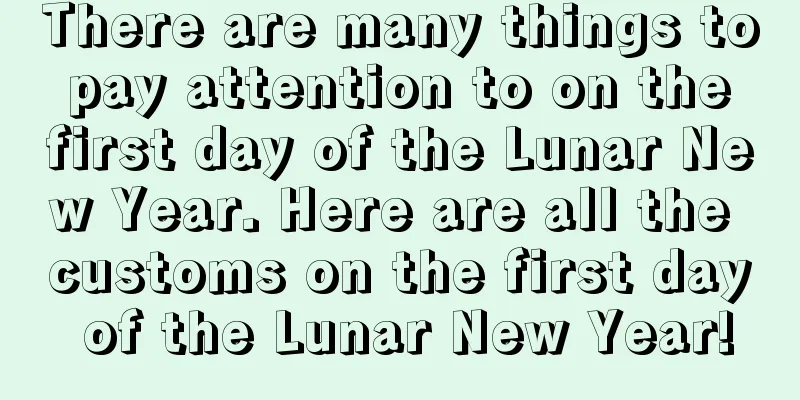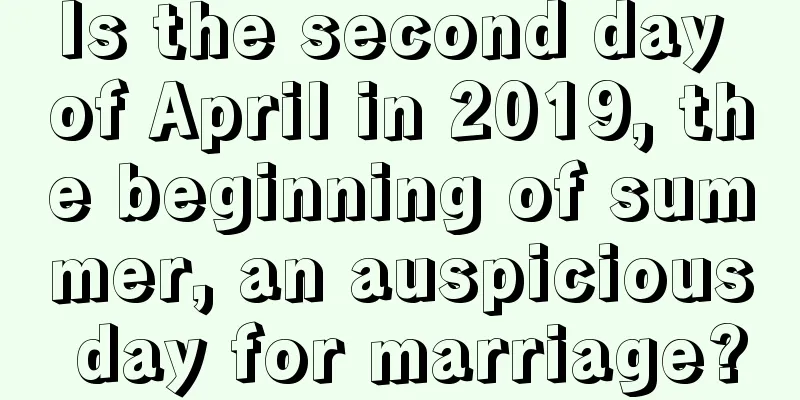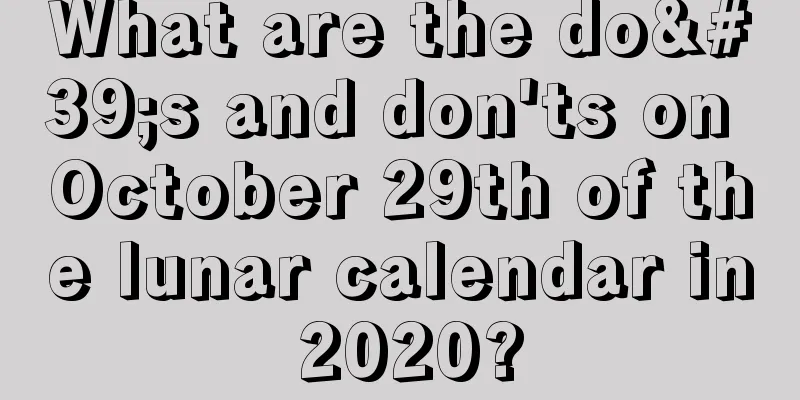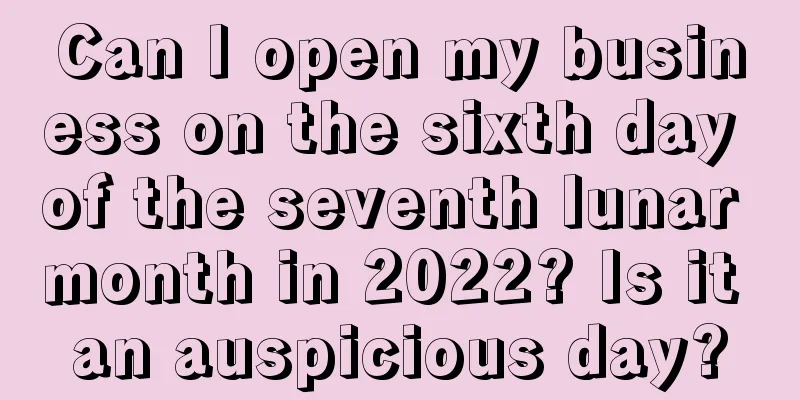There are many things to pay attention to on the first day of the Lunar New Year. Here are all the customs on the first day of the Lunar New Year!

Introduction: The first day of the first lunar month is the first day of the traditional Spring Festival, and this day has extraordinary significance. Because there are many folk customs that need to be paid attention to on the first day of the Lunar New Year. So, are there any customs and practices that we should pay attention to on New Year’s Day? Now, let’s follow the editor to learn about it. A year's plan begins with spring, and the Spring Festival is an important traditional festival of ours. Do you want to know more about the Spring Festival? Come and take a look at the Spring Festival special topic carefully prepared by Mr. Shui Mo!The Origin of the First Day of the Lunar New YearThe Spring Festival is commonly known as "New Year's Day". Its original name is "New Year's Day". Du Taiqing of the Sui Dynasty said in "Wuzhu Baodian": "The first month is the Duanyue, and the first day is New Year's Day, which is also called Zhengchao or Yuanshuo." The original meaning of "yuan" is "head", and later it was extended to "beginning". Because this day is the first day of the year, the first day of spring, and the first day of the first month, it is called "Sanyuan"; because this day is also the first day of the year, the first day of the month, and the first day of the day, it is also called "Sanchao"; and because it is the first new moon day, it is also called "Yuanshuo". The first day of the first lunar month is also known as Shangri, Zhengchao, Sanshuo and Sanshi, which means that the first day of the first lunar month is the beginning of the year, month and day.A complete guide to the customs on the first day of the first lunar monthThe first day of the first lunar month is about setting off firecrackers for opening the door: On the morning of the Spring Festival, to wish for good luck, people set off firecrackers first, which are called "firecrackers for opening the door". After the sound of firecrackers, the ground is covered with red fragments, as bright as brocade, which is called "Mantanghong". At this time, the streets were full of auspiciousness and joy. New Year's greetings, on the first day of the Lunar New Year, it is essential to visit relatives and friends or call to say hello, say "Happy New Year", and wish everyone good luck throughout the year. It is said that the first day of the first lunar month is the birthday of the broom. You cannot use the broom on this day, otherwise it will sweep away your luck and money, and attract "broom stars" and bring bad luck. If you must sweep the floor, you must sweep from the outside to the inside. You cannot throw water or garbage outside on this day, for fear of losing money. Today, many places still keep the custom of cleaning the house on New Year's Eve, not sweeping the house or taking out the garbage on New Year's Day, and preparing a large bucket to hold waste water, which is not poured out on that day.New Year's greetings are a traditional custom among the Chinese people. It is a way for people to bid farewell to the old and welcome the new and express good wishes to each other. The original meaning of the word "Bainian" is to wish the elders a happy New Year. New Year greetings usually start at home. On the morning of the first day of the New Year, after getting up, the younger generation should first greet the elders and wish them good health, longevity and all the best. After receiving the greetings, the elders will distribute the "lucky money" prepared in advance to the younger generations. After paying New Year's greetings to the elders at home, people will also congratulate each other with a smile when they meet outside, and say auspicious words such as "Congratulations on making a fortune", "Good luck in all seasons", and "Happy New Year". Neighbors or relatives and friends will also visit each other to pay New Year's greetings or invite each other for drinks and entertainment. With the development of the times, the custom of New Year's greetings has continued to add new content and forms. In addition to following the traditional ways of greeting each other, people nowadays have also started to use ceremonial telegrams and phone calls to greet the New Year. Summary: Through the above article, I believe everyone has a certain understanding of the customs and etiquette that need to be paid attention to on the first day of the first lunar month. I hope it can be helpful to everyone. I wish you all peace, prosperity and good luck in the new year! After reading this article, there are more exciting content in the Spring Festival special topic, let’s take a look! |
Recommend
How about July 22nd of the lunar calendar in 2021? Is it suitable for travel?
The 15th day of July is the Zhongyuan Festival, al...
Is the second day of Qingming Festival in 2020 a good day? Is April 5 a good day to repair graves?
Introduction: Every day has its good and bad luck,...
Is August 24th of the lunar calendar 2022 suitable for offering sacrifices? What are the auspicious times?
Since ancient times, China has had the custom of w...
Is May 30th of the lunar calendar in the Year of the Rat 2020 a suitable day to sign a contract? What should I pay attention to when signing a contract?
Is May 30th of the lunar calendar in the Year of t...
Query of unlucky days in April of the lunar calendar in 2018
Unlucky days are usually taboo for people. Let the...
In which direction is the God of Happiness on the first day of April in the lunar calendar in 2020? Will the God of Happiness bring good news?
The God of Joy is a deity that brings joy to peop...
Who are the great people and celebrities born on September 23rd during the Autumnal Equinox?
The Autumnal Equinox in August brings a bit of aut...
List of auspicious dates for renovation and groundbreaking in March of the lunar calendar in 2018
China is a particularly particular country. People...
Is the tenth day of the second lunar month in 2021 a good day? Is it an auspicious day?
The quality of every day is different, so let’s ta...
Is it suitable to move into new house during the Frost Descent in 2021? What are the requirements for moving into a new home?
During the Frost Descent season, the grass and tre...
Is it suitable to pick up a car on September 12 of the lunar calendar in 2017? Is it good to drive a new car on the road?
We have quietly stepped into a season full of har...
How is the twelfth day of the first lunar month in 2021? What is it suitable for?
In the first month of the new year, both adults an...
Should we send eggs on the beginning of summer? Is it good to eat eggs on the beginning of summer?
The Beginning of Summer marks the farewell to spri...
Is September 23rd of the lunar calendar 2020 suitable for marriage?
Is September 23rd of the lunar calendar 2020 suit...
Is February 16th of the lunar calendar in 2021 an auspicious day for sacrifices?
Is February 16th of the lunar calendar in 2021 an ...









